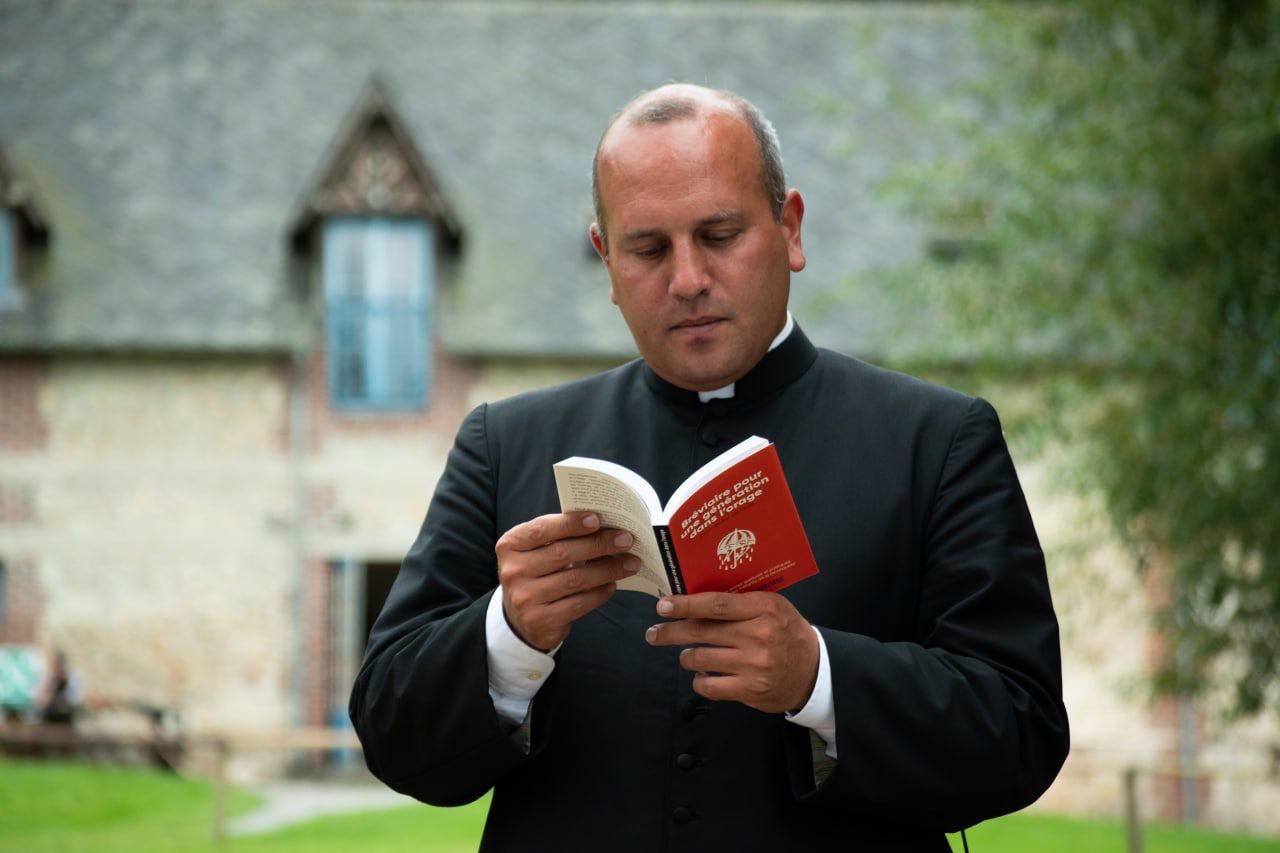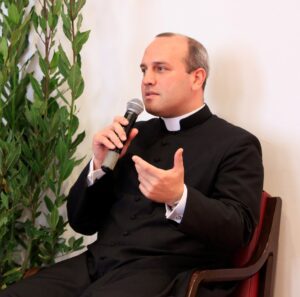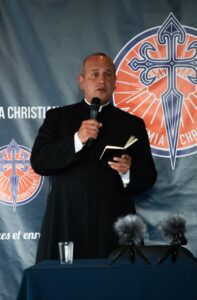
“The best response to the violence is not hatred, but the daily courage of those who continue to believe that ideas are fought with other ideas. Never with violence.”
In a de-Christianized and anti-clerical France, it is not good form for a clergyman to be in the spotlight, all the more so if he is the champion of an uninhibited Catholicism, solidly anchored in national traditions.
Father Matthieu Raffray—a priest of the Institute of the Good Shepherd, an apostolic life society with a traditionalist inclination—has learned this the hard way. He has been the subject of a smear campaign by some in the left-wing media in recent months as his popularity in France has grown.
Father Raffray became known to the general public in 2020 following an interview with the famous French YouTuber Baptiste Marchais, during which he pleaded for a return of “virile Catholicism” and patriotic sentiment in the Catholic ranks. Particularly popular with young people, almost all of his interviews garner hundreds of thousands of views.
From divisions within the Church to societal and political issues, to the most profound spiritual questions, this priest leaves no subject untouched and captures audiences with his audacity and outspokenness, even though Church hierarchy is often criticized for letting itself be dominated by political correctness and passing fashions.

This sudden popularity has not gone unnoticed by the mainstream press, which has already identified him as a new leader of right-wing Catholics.
Born in 1979 into a family of nine children, Matthieu Raffray studied mathematics before being ordained a priest in 2009. He holds a doctorate in philosophy and teaches at the Pontifical University of Saint Thomas Aquinas (Angelicum) in Rome.The European Conservative interviewed him against the backdrop of increased divisions within the Catholic Church after Pope Francis sharply curtailed the celebration of the Traditional Latin Mass. We discussed his views on the political situation in France after the recent presidential elections; and on the growing infatuation of European youth with the traditionalist Catholic movement.
Since the publication of the motu proprio, I have been engaged in a spiritual fight for the survival of the traditional liturgy for the benefit of the whole Church. It is true that Traditionis Custodes was a real shock for me, because the pope had never before expressed such a rejection of the traditional Mass. Considering how open the pope is to even the most outlandish progressive proposals, this text is still incomprehensible.
But in reality, it seems to me that the motu proprio has had a completely unexpected effect. For a year now, the traditionalist movement in the Church has returned to the forefront: the Mass and Liturgy have become subjects of primary importance for the whole Church. This hasn’t been the case so since Benedict XVI, who succeeded in imposing a kind of tacit acceptance of both forms of the rite. Over the past year, some theologians and bishops have unashamedly shown their real detestation of the Tridentine Mass!
Thirty years ago, those who defended a traditional vision of the Church and of society were a small, hidden minority, composed mainly of conservatives, who were often labeled nostalgic. Today, it is very interesting to note that thousands of young people are getting closer to the traditional Mass, in France and globally, even though they only discovered it during the last two years: we can speak of a real renewal, a rebirth of this attachment to the Tradition of the Church. It is now a movement that cannot be stopped.
Divine Providence allows collective trials to awaken the conscience of generations. This is what is happening today: although young people used to be completely indifferent to the question of God and religion, there is a kind of sudden awakening! Young people have been contacting me every day for over a year on Instagram to ask me how to get back to the Catholic faith, to be baptized, to attend traditional Mass, to practice again, etc.
In total, I have received several hundred, if not several thousand, messages along these lines. I am convinced that this is just the beginning of a real return of young people to the Catholic faith in France. All my fellow priests in the various cities and parishes are seeing the same thing: the number of catechumens has increased perhaps tenfold compared to five years ago.
First of all, I think that we should not oppose different churches in this way: there is only one Church, that of Jesus Christ. Of course, there are different ways of doing things, different ‘sensibilities.’ Indeed, I believe that the young people who turn to the Church today are looking for Catholic tradition and identity: they are looking for a faith that is ardent, assumed, and proud!
There are various factors that come into play: first of all, the backlash of excessive progressivism. Young people are very skeptical about the absurdities of the ‘woke’ mentality, and if they turn to faith, it is precisely to escape it. Secondly, the COVID-19 lockdown was paradoxically a good thing, because many young people opened their eyes to realize that the wonderful world of limitless hedonism they had been promised could turn into an unbearable mental prison in a few days.
In addition, the political atmosphere in France in recent months has played a fundamental role. One can speak, in particular, of a ‘Zemmour effect’: through it many young people have rediscovered the pride of being French, Catholics, Westerners. This has had an important role in the return to the Catholic faith and to tradition.
For a year, until May 2022, we were able to say on social networks, in schoolyards, and in front of coffee machines that we were happy to be French, that we were patriotic, that we were Catholics and proud to be. It’s been more than 20 years since that was the case. I call this the ‘Zemmour effect’ because many of the young people who have contacted me in the past year have come back to the faith through patriotism. This is natural, because the Catholic faith is something incarnate, so it is social! Then, of course, this cultural questioning has to be transformed into something deeper, something truly supernatural and spiritual, but in fact it works. This is how France became Catholic: by the baptism of Clovis!
To be very clear, I did not officially support Eric Zemmour during this presidential campaign. I simply said in an interview that a Catholic should defend his country, because this is required by the 4th commandment of God: you shall honor your father and your mother, and therefore also your ‘mother country.’ Now Zemmour proposed a patriotic policy. It was therefore quite possible for a Catholic to vote for him. But it is not for me, as a priest, to call for a vote for this or that candidate.
I think it is indeed the duty of priests to be politically involved, but in the noble sense of the term. It is not a question of endorsing a politician, because to use his spiritual authority to give voting instructions would be wrong. The priest does not have to substitute himself for the freedom of each person. But it is nevertheless his role to give keys and principles to enable the Catholic faithful to understand the social and religious stakes of the elections.
When a priest speaks about God, this does not simply concern a private and individual dimension, because God deserves a place in the public space—the first place, actually! This has always been Catholic doctrine: the role of priests is to defend the social doctrine of the Church, that is, the doctrine of Christ the King, which is the realization in the public space of the conditions necessary for a peaceful Christian life.
I think that one of the great theological errors of the 20th century, following the Second Vatican Council, was to have abandoned this ideal of Christianity and to have reduced faith to a personal and individual choice. The role of the priest is therefore sometimes to take a political stand, in the sense that he invests in the life of the city, which consists in defending the Christian heritage of which we are the custodians. In this sense, we must fight against laws that oppose the freedom of the Catholic faith, life, natural death, and even common sense.
It’s all very recent. I’ve been on social media for a little over a year now. My background is primarily academic, and I used to address specialists in philosophy or theology. However, I realized, while exploring social media, that the general image of the Catholic is that of a weak victim: the Catholic is usually portrayed as a person who has no ideas, no convictions, who accepts and tolerates everything. This makes it possible to spit on him without any problem. The media does this every day, under the cover of an irony that they obviously do not dare to use against other religions.

This is not the image I have of Catholicism and Jesus Christ. Jesus accepted his Passion with fortitude, virtue, and a spirit of sacrifice, not because he had no other solution, and even less because of weakness. He never repented for what he said or did! Today, on the contrary, a false humility, a false vision of mercy, is advocated, which destroys the true message of Christ. I myself was educated with the examples of St Louis, St Joan of Arc, the crusaders who gave their lives to free the Tomb of Christ from the invasion and exactions of the Muslims, the knights of the Middle Ages ,and the great missionaries who went to be eaten by the Indians in Canada. This is Catholicism. This is the history of the Church, the history of our ancestors in faith: conquerors, civilizers, heroes, and saints!
This is the virility that Catholics must recover: it is not a question of being muscular and even less of being stupid. On the contrary, we must rediscover the greatness of faith, of a Catholic faith that is assumed and proud. This is a real need for a whole section of youth who feel completely abandoned by the Church: who would want to be part of a religion of losers?
This criticism seems absurd to me. I think that the root of the problem is the error that can be called ‘naturalistic’—namely an opposition between the Christian ideal, which is supernatural, and the human earthly ideal. The universalism of faith and charity is a universalism of union with God, which is fulfilled in heaven: all men are brothers because they have the same heavenly Father, and they are called to the same beatitude for eternity. But never, neither in the teaching of Christ, nor in the texts of the Fathers of the Church, nor in the whole history of the Church, has Christianity been opposed to the attachment to one’s roots, to one’s homeland, and to the defense of one’s territory or one’s people. This would be in contradiction, as I have already said, with the commandment that God has given us to love our father and mother, and therefore all those whose heirs we are, the descendants.
Today there tends to be an inversion, an internal corruption of Christ’s message: his teaching is first of all supernatural, since he teaches us that at the end of our earthly pilgrimage, we are all called to this new life where there will no longer be, as St. Paul reminds us, either brothers or sisters, neither Jews nor Gentiles. However, Christ never asked the Jews to stop being Jews, nor did he ask that of the Greeks or the Romans. He is not asking us today, as some people wrongly claim, to give up our identity!
Clearly not. I even think that in certain circumstances, as is the case in France today, it is the duty of every Catholic to oppose uncontrolled immigration, especially those who have political responsibilities. One day, we will be held accountable by our descendants over the consequences of immigration. Beyond the questions of security, there are civilizational questions to consider. In certain areas of France today, it is obvious that we are no longer on Christian soil.
The humanist lecturers can shout as loud as they want; God is the one to whom we are accountable for the faith we must transmit and the charity we must spread in the world. It is the Christians who will have to account for this disappearance of the Christian faith. God will ask us what we have done with the spiritual heritage of our ancestors, with what they had built, often at the price of so many sacrifices.
The problem is not the immigrants themselves: they are the victims of political choices and decisions. True charity consists in wanting the good of one’s fellow citizens. The good of mankind, from a Christian point of view, is first of all their eternal salvation: the first charity is therefore to allow the next generations to live in a Christian country! It is therefore our duty, today, to open our eyes to the religious and civilizational stakes of immigration. It is very possible that tomorrow France and Europe will no longer be Christian lands, because of the cowardice of those who have allowed them to be Islamized or de-Christianized.
I am disappointed that many Catholics and conservatives are totally dependent on the left-wing media and on left-wing thinking. For example, I was recently targeted by an Antifa website, and several left-wing media outlets picked up their attacks, which is not surprising.
What shocked me, however, was the reaction of a number of Catholics and right-wing people who were more concerned about my image and reputation than about the truth of these accusations. You have to understand that these left-wing activists, the enemies of the faith, hate us no matter what we do or say. They want us gone. We must therefore stop being psychologically dependent on our enemies, stop trying to please them, to buy a nice image with them: not only is it useless, but this attitude also leads to compromise, and finally to the progressive loss of our principles. It is this mentality that harms the ideas we defend, and makes us lose credibility.
Moreover, many of the young people in the process of conversion that we spoke of earlier feel abandoned because of this compromise. On the contrary, it is through a certain intransigence on ideas (combined with a great mercy and patience towards people) that many non-Catholics will return to the faith. They expect a clear word, a word of Truth. It is therefore a sincere and profound love of the truth that Christians must urgently rediscover: this truth taught, incarnated by Jesus Christ, which alone can make us free.
